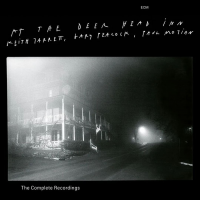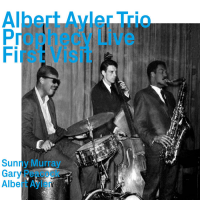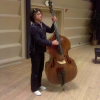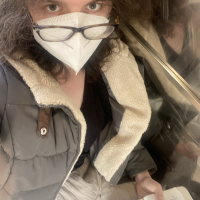Home » Jazz Musicians » Gary Peacock
Gary Peacock
Bassist Gary Peacock played a major role in the development of avant-garde jazz. He has worked with the likes of Miles Davis, Bill Evans, Albert Ayler, Don Cherry}, {{Barney Kessel, Don Ellis, Terry Gibbs, Shorty Rogers, the Paul Bley Trio, Jimmy Giuffre, Roland Kirk and George Russell, among others. His recorded output is enormous — ECM Records alone lists fifty-one CDs on which he is featured. He has collaborated frequently with Ralph Towner in duet format, and since the late '70s has played and recorded in a world-renowned trio with Keith Jarrett and Jack DeJohnette.
Peacock was born in Burley, Idaho, on May 12, 1935; He grew up in Yakima, Washington, where he attended Yakima Senior High School. In school, he played piano, trumpet, and drums, When he was 15, he attended a Jazz at the Philharmonic concert featuring Oscar Peterson and Ray Brown.
Read moreTags
At The Deer Head Inn: The Complete Recordings

by Joshua Weiner
Pianist Keith Jarrett is the only artist with his own subheading on the main menu of ECM Records' new US website. That attests to his fruitful association, beginning in 1971 and continuing to the present day, with the independent German label known for its dedication to artistic freedom and beautiful sound. Though a series of strokes has sadly silenced Jarrett since 2018, ECM continues to enrich his discography with both new releases (a series of 2016 European concert recordings, including ...
Continue ReadingAlbert Ayler Trio: Prophecy Live, First Visit

by Glenn Astarita
This 1964 New York City recording, now remastered and released on the Ezzthetics label, captures Albert Ayler with Gary Peacock and Sunny Murray at a crucial juncture in the saxophonist's development. This performance at the Cellar Cafe marks an early, vital snapshot of a trio that would become foundational to the free jazz movement. It is a chance to hear Ayler's radical sonic explorations in their initial stages before his sound fully solidified into the intensely spiritual and often ecstatic ...
Continue ReadingAlbert Ayler Trio: Prophecy Live, First Visit

by Mark Corroto
No jazz artist has been as polarizing as Albert Ayler. Listeners either revere him as a prophet or dismiss him as a charlatan. To some, his music is a divine revelation; to others, an indecipherable cacophony. But while Ayler's music was undeniably radical, he was no insurrectionist-- he was simply a true original. His sound was Ayler being Ayler. Born in Cleveland, Ohio, in 1936, Ayler's life ended in mystery in 1970 when his body was found floating ...
Continue ReadingDon Ellis: How Time Passes to Essence Revisited

by Angelo Leonardi
Nelle storie del jazz Don Ellis è ricordato principalmente per l'innovativa big band che guidò per un decennio, dalla metà degli anni sessanta. Questa preziosa riedizione ci rammenta i suoi inizi di carriera, quando esplorava nuove soluzioni a partire dalla tromba: accoppia il suo debutto in quartetto (...How Time Passes...) dell'ottobre 1960 con alcuni brani di Essence, risalente al 1962. Il trombettista losangelino aveva appena compiuto 26 anni e registrava il primo album accompagnato dal pianista Jaki Byard, ...
Continue ReadingKeith Jarrett: The Old Country: More from the Deer Head Inn

by Alberto Bazzurro
Disco come sempre di gran classe, questo, inciso il 16 settembre 1992 al Deer Head Inn di Delaware Water Gap, Pennsylvania, con Paul Motian in luogo del “canonico" Jack DeJohnette, ma con immutate le stimmate del già celeberrimo (nonché celebratissimo) standard trio di un Keith Jarrett all'epoca quarantasettenne e nel pieno della sua maturità tecnico-espressiva. Il materiale, che va a integrare quanto già edito ormai quasi trentun anni fa in At the Deer Head Inn (il sottotitolo ...
Continue ReadingKeith Jarrett: The Old Country: More from the Deer Head Inn

by Mario Calvitti
Già da alcuni anni l'attività pianistica di Keith Jarrett si è forzatamente interrotta per motivi legati alle condizioni di salute dell'artista, colpito da ictus, ma la sua musica continua a venire pubblicata con novità discografiche provenienti dagli archivi ECM, alternando le esecuzioni jazzistiche a quelle classiche con cadenza più o meno annuale. Questo nuovo album rappresenta un'aggiunta importante alla sua discografia, dando dopo 30 anni un seguito all'album At the Deer Head Inn con la pubblicazione di otto brani inediti ...
Continue ReadingKeith Jarrett: The Old Country: More from the Deer Head Inn

by Jack Kenny
Keith Jarrett remarked as he listened to a tape of the session: “I think that you can hear on this tape, what jazz is all about." What did he mean? Was he reacting to criticisms of his long-form improvisations? Was it because he was in a small venue that prioritized jazz? Of course, you can hear “what jazz is all about." Major musicians accompanied him: bassist Gary Peacock, Paul Motian, a master drummer he had not played with ...
Continue ReadingJazz Musician of the Day: Gary Peacock

Source:
Michael Ricci
All About Jazz is celebrating Gary Peacock's birthday today!
Bassist Gary Peacock played a major role in the development of avant-garde jazz. He has worked with the likes of Miles Davis, Bill Evans, Albert Ayler, Don Cherry}, {{Barney Kessel, Don Ellis, Terry Gibbs, Shorty Rogers, the Paul Bley Trio, Jimmy Giuffre, Roland Kirk and George Russell, among others. His recorded output is enormous — ECM Records alone lists fifty-one CDs on which he is featured. He has collaborated frequently with ...
read more
Jazz Musician of the Day: Gary Peacock

Source:
Michael Ricci
All About Jazz is celebrating Gary Peacock's birthday today!
Bassist Gary Peacock played a major role in the development of avant-garde jazz. He has worked with the likes of Miles Davis, Bill Evans, Albert Ayler, Don Cherry}, {{Barney Kessel, Don Ellis, Terry Gibbs, Shorty Rogers, the Paul Bley Trio, Jimmy Giuffre, Roland Kirk and George Russell, among others. His recorded output is enormous — ECM Records alone lists fifty-one CDs on which he is featured. He has collaborated frequently with ...
read more
Jazz Musician of the Day: Gary Peacock

Source:
Michael Ricci
All About Jazz is celebrating Gary Peacock's birthday today!
Bassist Gary Peacock has played a major role in the development of avant-garde jazz. He has worked with the likes of Miles Davis, Bill Evans, Albert Ayler, Don Cherry, Barney Kessel, Don Ellis, Terry Gibbs, Shorty Rogers, the Paul Bley Trio, Jimmy Giuffre, Roland Kirk and George Russell, among others. His recorded output is enormous — ECM Records alone lists thirty CDs on which he is featured. He has collaborated frequently ...
read more
Gary Peacock: West Coast (1959-62)

Source:
JazzWax by Marc Myers
Bassist Gary Peacock, who died in September of 2020, was probably best known for Trio '64, his sole album in 1963 with Bill Evans, as well as his work with Albert Ayler, Paul Bley, Marc Copland and Keith Jarrett. But before Trio '64, Peacock spent several years in Los Angeles working as a sideman. On the West Coast, Peacock emerged as part of a school of conversationalist bassists who didn't just keep time but were expected to engage with a ...
read more
Jazz Musician of the Day: Gary Peacock

Source:
Michael Ricci
All About Jazz is celebrating Gary Peacock's birthday today!
Bassist Gary Peacock has played a major role in the development of avant-garde jazz. He has worked with the likes of Miles Davis, Bill Evans, Albert Ayler, Don Cherry, Barney Kessel, Don Ellis, Terry Gibbs, Shorty Rogers, the Paul Bley Trio, Jimmy Giuffre, Roland Kirk and George Russell, among others. His recorded output is enormous — ECM Records alone lists thirty CDs on which he is featured. He has collaborated frequently ...
read more
Jazz Musician of the Day: Gary Peacock

Source:
Michael Ricci
All About Jazz is celebrating Gary Peacock's birthday today!
Bassist Gary Peacock has played a major role in the development of avant-garde jazz. He has worked with the likes of Miles Davis, Bill Evans, Albert Ayler, Don Cherry, Barney Kessel, Don Ellis, Terry Gibbs, Shorty Rogers, the Paul Bley Trio, Jimmy Giuffre, Roland Kirk and George Russell, among others. His recorded output is enormous — ECM Records alone lists thirty CDs on which he is featured... Read more.
Place our ...
read more
Jazz Musician of the Day: Gary Peacock

Source:
Michael Ricci
All About Jazz is celebrating Gary Peacock's birthday today!
Bassist Gary Peacock has played a major role in the development of avant-garde jazz. He has worked with the likes of Miles Davis, Bill Evans, Albert Ayler, Don Cherry, Barney Kessel, Don Ellis, Terry Gibbs, Shorty Rogers, the Paul Bley Trio, Jimmy Giuffre, Roland Kirk and George Russell, among others. His recorded output is enormous — ECM Records alone lists thirty CDs on which he is featured... Read more.
Place our ...
read more
Jazz Musician of the Day: Gary Peacock

Source:
Michael Ricci
All About Jazz is celebrating Gary Peacock's birthday today!
Bassist Gary Peacock has played a major role in the development of avant-garde jazz. He has worked with the likes of Miles Davis, Bill Evans, Albert Ayler, Don Cherry, Barney Kessel, Don Ellis, Terry Gibbs, Shorty Rogers, the Paul Bley Trio, Jimmy Giuffre, Roland Kirk and George Russell, among others. His recorded output is enormous — ECM Records alone lists thirty CDs on which he is featured... Read more.
Place our ...
read more
Jazz Musician of the Day: Gary Peacock

Source:
Michael Ricci
All About Jazz is celebrating Gary Peacock's birthday today!
Bassist Gary Peacock has played a major role in the development of avant-garde jazz. He has worked with the likes of Miles Davis, Bill Evans, Albert Ayler, Don Cherry, Barney Kessel, Don Ellis, Terry Gibbs, Shorty Rogers, the Paul Bley Trio, Jimmy Giuffre, Roland Kirk and George Russell, among others. His recorded output is enormous — ECM Records alone lists thirty CDs on which he is featured... Read more.
Place our ...
read more
Jazz Musician of the Day: Gary Peacock

Source:
Michael Ricci
All About Jazz is celebrating Gary Peacock's birthday today!
Bassist Gary Peacock has played a major role in the development of avant-garde jazz. He has worked with the likes of Miles Davis, Bill Evans, Albert Ayler, Don Cherry, Barney Kessel, Don Ellis, Terry Gibbs, Shorty Rogers, the Paul Bley Trio, Jimmy Giuffre, Roland Kirk and George Russell, among others. His recorded output is enormous — ECM Records alone lists thirty CDs on which he is featured... Read more.
Place our ...
read more
"As a bassist, Gary Peacock has always been a stealth virtuoso. What he plays often requires phenomenal speed and facility, but the power and originality of his music invariably draw the listener’s attention away from Peacock’s technical prowess. Even though it opens with a remarkable solo statement that stretches from thumb position down to the lowest reaches of the fingerboard, ‘Tangents’ is unlikely to change that notion. […] the group’s defining character remains the all- in equality of its interplay, maintaining a creative balance between piano, bass and drums regardless of whether the music is conventionally structured, like Miles Davis’’Blue In Green’, or as open-ended as Peacock’s title tune." J.D
Ray Brown
bass, acousticOrnette Coleman
saxophone, altoScott LaFaro
bassPaul Chambers
bass, acousticJohn Geggie
bassBryan White
bass, acousticPetros Klampanis
bass, acousticMarco de Tilla
bassSteven Husted
bass, acousticDylan Taylor
bassPatrick Bleakley
bassNicolas Ojeda
bass, acousticChris Maresh
bassGreg Oliva
bass, electricBruce Phares
bass, acousticYosef Gutman Levitt
drumsSpiral Trio
pianoPhotos
Music
Straight No Chaser
From: The Old Country: More from the...By Gary Peacock

























































